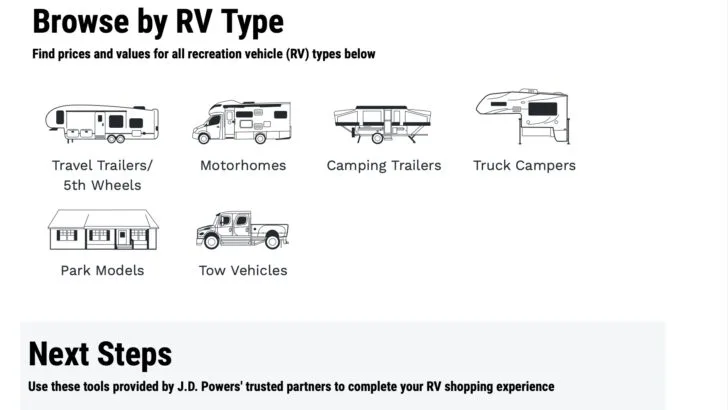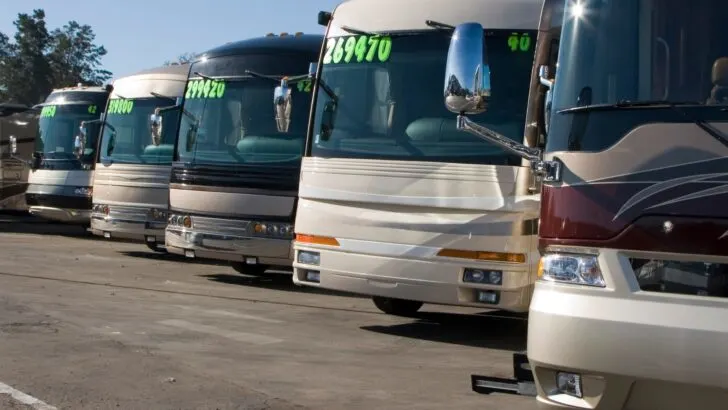With the boom in RVing, there’s been a boom in used RV sales. Whether you’re buying or selling an RV, understanding current RV values is important.
There are many reasons someone might want to sell their RV. Some people try RVing and decide it’s not for them. Others start out with a small used rig and love it so much that they decide to upgrade to something bigger and/or newer.
Whatever the reason, more and more people are looking to buy a recreational vehicle or upgrade one they’ve already been enjoying. So there are usually lots of potential buyers out there.
Whether it’s time to sell your RV or you’re interested in shopping for a new-to-you motorhome or travel trailer, understanding RV values is key. (Of course, knowing the value of an RV when buying is important too!)
So, let’s take a look at how to go about determining reasonable RV values.
How Do I Know How Much an RV is Worth?
There are a number of ways to figure out RV values (and a number of different approaches on how to sell an RV).
Keep in mind that listed book values won’t necessarily match up with actual market value. They’re a guide.
Market value takes into consideration the book value along with current market conditions. That is, how many RVs there are on the market vs. how many buyers there are, (supply vs. demand).
Market value even considers the type of RV you have to sell in relation to the popularity of that type of RV and how many are available.
For example, if there’s a big boom in Class B RVs and there aren’t a lot of them on the market, they’ll command higher prices. (Supply & Demand 101!)
The true RV value should also be reflected in your insurance policy, where stated value coverage should be noted (as opposed to book value). In other words, you need to accurately determine the value of the RV so that your RV insurance policy reflects that actual market value amount in case of a total loss.
So, while there are book values to consider, they’re not the same as actual market values.
Let’s take a look at various ways to determine the actual market value of an RV.
NADA RV Values
NADA is the National Automobile Dealers Association. The NADA (now JD Power Values) has been guiding the market on used vehicles and RVs for nearly a century… since 1933.
Whether you’re working with a dealer or selling your RV privately, you’ll want to consult the NADA guide to determine the book value of your rig. This guide is consulted by private buyers, sellers, professional dealers, and insurance companies as part of the data used to determine RV values.

To begin your research, you may select the type of RV for which you’re trying to determine the value.
You can browse by the guide based on RV type. You can then enter or select your year, make, and model as you begin your search. You’ll have the opportunity to add additional information about your rig to help determine book value before listing your RV for sale.
Just remember that NADA RV values provide only one piece of the equation in determining the actual market value of an RV. It is significant, but it’s not the only thing that matters.
Let’s take a look at other data to consider.
Kelley Blue Book Values
Kelley Blue Book is another popular way to obtain information on vehicle valuation. In fact, “Kelley Blue Book” is synonymous with “auto valuation” for many of us. And it’s great for valuing a towed car, or the vehicle you use to pull a towable, by make, model, and year.
But unfortunately, there’s no specific Kelley Blue Book for RVs.
So, you can use NADA’s RV tools to get an RV valuation, and then continue your research by obtaining additional market-related information from any or all of the following sites.
RV Sales Sites
To assess an RV’s market value (based on current market conditions), you’ll want to conduct some research using a variety of RV sales sites in the area where you intend to sell your rig.
This allows you to look at RVs that are similar to yours in age, make, model, size, type, condition, and amenities so that you can see the prices similar rigs are selling for. Keep in mind that these are asking prices, not actual sale prices.
These would include the following sites and any others that may be local to you in your home state.
RV Dealers (Trade-in Value)
It’s also good to know the trade-in value before setting a sale price or negotiating with a potential buyer. Trade-in value is what a dealer would pay for your rig when you’re trading it on a new or used one.

Knowing the trade-in value of your RV is another piece of information you can use to determine an RV’s value.
What you get for a trade-in value will certainly be less than you can get with a private sale, but some people would rather not deal with a private sale and are happy to take less when they’re buying a new RV. And there may be sales tax savings, depending on your state/province.
But dealers can manipulate the numbers between the new rig and your trade-in. If they charge more (or provide a smaller discount) for the new RV, they can seem to be offering more for your trade.
And, of course, the opposite can happen as well. They can offer you an incredibly low price on the new RV, but undervalue your trade. Yes, it can be a shell game… figures lie and liars figure.
Either way, keep all of this in mind and consider getting more than one valuation on your RV.
RV Consignment
Finally, RV consignment businesses will sell your rig for you if you choose.
They’ll photograph your rig, advertise it, and deal with potential buyers, showing and negotiating the sale on your behalf.
You can do this privately with a consignment person or through an RV dealership that takes consignments.
All of this comes at a cost, of course. You’ll be forfeiting some of the sale price as payment for consignment services.
For some people, this is well worth the cost because they just don’t want to have to deal with people coming to look at the RV. Between test drives, price negotiations, paperwork, etc, some prefer to outsource all that.
All of this is taken care of for you with a consignment sale.
You can also consult a consignor to find out how much they’d ask for your rig. You can use that information to help you set the sale price if you decide to sell on your own instead.
What Do I Do Once I’ve Determined the Sale Price of My RV?
Once you’ve arrived at a sale price you’re comfortable with, you’ll want to read our post on how to sell an RV for guidance on how to go about selling your rig.
Be sure to use caution when dealing with strangers on the internet or phone, and of course, in person. Be wary of potential scams, and use a professional financial institution to conduct any exchange of funds.
Free RVing Tips, Tricks, Reviews, Giveaways & More
Subscribe to our daily newsletter! We’ve been full-time RVers for 20 years (!) and share everything we’ve learned about RVing in our daily blog posts. Join our online community to receive a wealth of great RVing knowledge delivered right to your inbox.
Whether this is your first time on the road or you’re a seasoned full-timer, you’ll love the wide range of RVing topics we cover. Don’t miss a single article or any of our famous RV gear Giveaways — Subscribe today!

